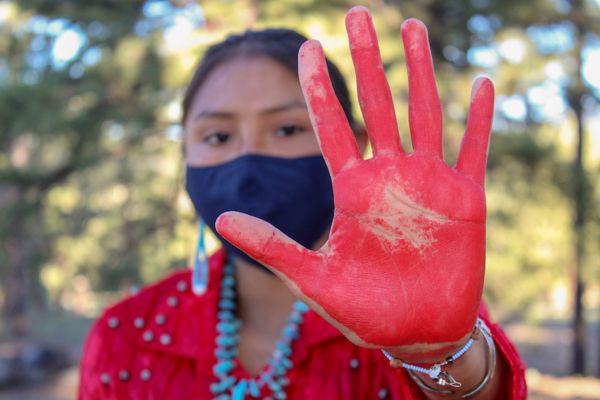
- Details
- By Elyse Wild
On July 26th, the Not Invisible Act Commission (NIAC) wrapped up its final stop on a seven-city nationwide tour gathering testimony from Native Americans affected by the Missing and Murdered Indigenous Persons (MMIP) crisis.
This week’s hearing took place in Billings, Montana, where Tribal officials, Native leaders, law enforcement and government officials convened for a panel discussion and to bear witness to testimony from MMIP survivors and family members. The hearing was also live streamed.
The hearing opened with a prayer and moment of silence, followed by an invitation for those in attendance to speak the name of a missing or murdered loved one. Names were spoken aloud for ten minutes.
Among those testifying was Carrisa Heavyrunner, whose 22-year-old daughter Mika Westwolf (Blackfeet) was killed in a hit-and-run on March 31 on Highway 93 near Arlee, Montana. Despite the Montana Highway Patrol identifying the driver as Sunny K. White, no arrests have been made in Westwolf’s death.
Heavyrunner told Billings news station NonStop Local that the lack of urgency from law enforcement is slowing healing for Native American communities affected by the MMIP crisis.
“You can’t heal if you’re not able to be seen and be heard,” Heavyrunner said. “That’s why I wanted to help these women share their stories about their loved ones that they lost… We gotta keep Mika’s name and other MMIP families and victims out there because everyone tends to forget things so easily nowadays. We’ve gotta keep the momentum going.”
According to data from the Centers for Disease Control and Prevention, Native women living on reservations are murdered at a rate ten times higher than the national average. Lack of jurisdictional clarity, lack of collaboration between law enforcement bodies, and systemic apathy have led to thousands of unsolved cases in Indian Country. While there is no comprehensive data on MMIP, the Bureau of Indian Affairs estimates there are 4,200 unsolved MMIP cases have gone unsolved. The oldest MMIP case profile on the BIA’s public MMIP database dates back to 1969.
Montana is home to twelve Tribal Nations and ranks among the states with the highest number of MMIPs in the nation, according to a report from the Urban Indian Health Institute.
The 37-person Not Invisible Act Commission was launched in 2020 by Secretary of the Interior Deb Haaland (Laguna Pueblo). The commission is tasked with developing recommendations on improving intergovernmental collaboration on violent crimes in Indian Country and providing resources for survivors and victims’ families. Information and testimony gathered at the hearings will be part of the commission’s final report to Secretary Haaland, Attorney General Merrick Garland and Congress in October.
The commission will hold a nationwide virtual hearing on Aug. 1 and 2. Registration for the hearing can be found here.
More Stories Like This
Native News Weekly (August 25, 2024): D.C. BriefsUS Presidents in Their Own Words Concerning American Indians
Haaland Meets with Southern New Mexico Law Enforcement on Public Safety Priorities
This Day in History – Dec. 26, 1862: 38 Dakota Men Executed by Order of Abraham Lincoln
Merry Christmas 2025
Help us defend tribal sovereignty.
At Native News Online, our mission is rooted in telling the stories that strengthen sovereignty and uplift Indigenous voices — not just at year’s end, but every single day.
Because of your generosity last year, we were able to keep our reporters on the ground in tribal communities, at national gatherings and in the halls of Congress — covering the issues that matter most to Indian Country: sovereignty, culture, education, health and economic opportunity.
That support sustained us through a tough year in 2025. Now, as we look to the year ahead, we need your help right now to ensure warrior journalism remains strong — reporting that defends tribal sovereignty, amplifies Native truth, and holds power accountable.
 The stakes couldn't be higher. Your support keeps Native voices heard, Native stories told and Native sovereignty defended.
The stakes couldn't be higher. Your support keeps Native voices heard, Native stories told and Native sovereignty defended.
Stand with Warrior Journalism today.
Levi Rickert (Potawatomi), Editor & Publisher


